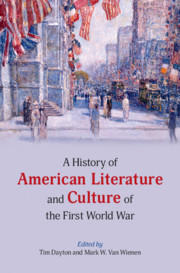Book contents
- A History of American Literature and Culture of the First World War
- A History of American Literature and Culture of the First World War
- Copyright page
- Contents
- Figures
- Contributors
- Acknowledgments
- Introduction America’s Great War at One Hundred (and Counting)
- Part I Genre and Medium
- Part II Settings and Subjects
- Chapter 9 The Peace Movement
- Chapter 10 Americans in France
- Chapter 11 German Americans
- Chapter 12 The English in America
- Chapter 13 Preparedness
- Chapter 14 Propaganda
- Chapter 15 Conscientious Objectors
- Chapter 16 Volunteers
- Chapter 17 African Americans
- Chapter 18 In the Midwest
- Chapter 19 In the South
- Chapter 20 Revolution
- Chapter 21 Monuments and Memorials
- Part III Transformations
- References
- Index
Chapter 13 - Preparedness
Theodore Roosevelt, Leonard Wood, and Rookie Rhymes
from Part II - Settings and Subjects
Published online by Cambridge University Press: 23 January 2021
- A History of American Literature and Culture of the First World War
- A History of American Literature and Culture of the First World War
- Copyright page
- Contents
- Figures
- Contributors
- Acknowledgments
- Introduction America’s Great War at One Hundred (and Counting)
- Part I Genre and Medium
- Part II Settings and Subjects
- Chapter 9 The Peace Movement
- Chapter 10 Americans in France
- Chapter 11 German Americans
- Chapter 12 The English in America
- Chapter 13 Preparedness
- Chapter 14 Propaganda
- Chapter 15 Conscientious Objectors
- Chapter 16 Volunteers
- Chapter 17 African Americans
- Chapter 18 In the Midwest
- Chapter 19 In the South
- Chapter 20 Revolution
- Chapter 21 Monuments and Memorials
- Part III Transformations
- References
- Index
Summary
On April 2nd, 1917, President Woodrow Wilson entered the halls of Congress and requested a declaration of war against Germany; however, pressure to intervene in the Great War had begun in 1914. This chapter focuses on this pressure. Specifically, it examines the military preparedness movement, and the cultural and political anxieties that fueled this movement. Spearheaded by Theodore Roosevelt and Leonard Wood, the movement established volunteer training camps across the United States. While the movement never led to the universal military training that Roosevelt and Wood hoped for, it exerted significant influence in the United States. Through the camps, Roosevelt’s and Wood’s lecture circuits, and literature such as the poetry collection Rookie Rhymes, the movement popularized militarist attitudes, which functioned as a panacea for broader problems of gender, class, and modernity. Most notably, the movement shaped thousands of elite men who held important positions in politics, finance, the media, and other spheres of American society—before, during, and after the war. This chapter unpacks the movement’s influence, as it illuminates the significance of preparedness to the historical record of the First World War.
- Type
- Chapter
- Information
- Publisher: Cambridge University PressPrint publication year: 2021
- 1
- Cited by

